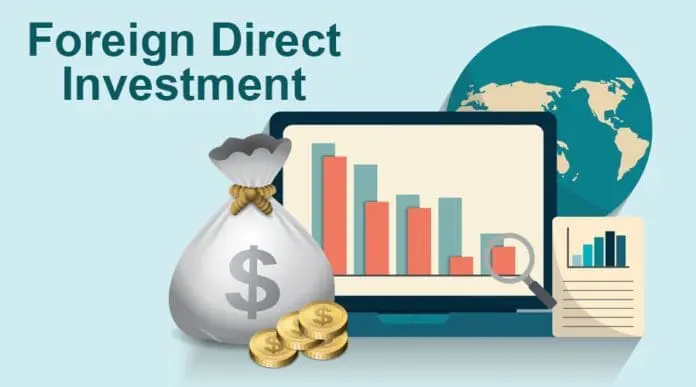Copyright ghanamma

China has once again emerged as Ghana’s largest source of foreign direct investment in 2025, cementing its position as a dominant economic partner as West Africa’s investment landscape experiences a dramatic rebound from pandemic era lows. Data from the Ghana Investment Promotion Centre shows that Chinese investors accounted for 22 of the 76 new FDI projects registered between January and June 2025, the highest number from any single country. India followed with 14 projects, while Nigeria ranked third with eight, according to the GIPC’s half-year investment report. The total value of all registered projects reached $862.96 million, representing a remarkable 381.91 percent increase compared to the $179.07 million recorded during the same period in 2024. This surge underscores renewed optimism in Ghana’s economic outlook amid ongoing reforms to stabilize the macroeconomic environment and improve the investment climate. Speaking at a recent engagement, Simon Madjie, the Chief Executive Officer of GIPC, revealed that Ghana has secured over $3.9 billion in Chinese foreign direct investment over the past decade. His comments reflected the deepening economic ties between the two nations and growing confidence in Ghana’s policy stability. “China’s strong presence in Ghana’s investment landscape reflects our deepening economic ties and the growing trust in Ghana’s policy stability,” Madjie noted. “Our focus is to ensure that these investments translate into jobs, technology transfer, and sustainable industrial growth.” The manufacturing sector dominated in project numbers for the first half of 2025, accounting for 32 new investments, while general trading led in terms of value with $622.92 million worth of capital commitments. This distribution suggests a shift in investment patterns, with more capital flowing into trading operations despite manufacturing attracting more individual projects. Once fully operational, the new projects are expected to create over 4,700 jobs across various sectors of the economy, underscoring the potential impact of these investments on employment and economic growth. The jobs creation potential represents a crucial component of Ghana’s economic recovery strategy as the country emerges from recent fiscal challenges. China’s engagement in Ghana’s economy has evolved considerably over the past decade. According to Madjie, Chinese investments have resulted in the execution of 424 projects across the country over the past ten years, creating more than 39,000 jobs, with approximately $2.7 billion directed to the manufacturing sector. The geographic spread of recent investments tells an interesting story. Chinese enterprises have established ventures ranging from ceramic tile production facilities in the Western Region to agro-processing plants in the Eastern Region. These projects signal a gradual shift from state-led mega infrastructure projects to private sector driven ventures focused on manufacturing and value addition. Trade and economic analysts view this diversification positively, particularly given Ghana’s persistent trade deficit with China. The deficit stood at nearly $3.2 billion in 2024, driven largely by imports of machinery, electronics, and consumer goods. Manufacturing investments that produce goods locally could help narrow this gap over time while creating employment opportunities. However, concerns persist about the long-term sustainability of Chinese-led investments, particularly regarding technology transfer, local ownership stakes, and environmental impact. These issues have emerged in other African countries with substantial Chinese investment presence, prompting calls for stronger regulatory frameworks and more assertive negotiation strategies. Dr. Patrick Asuming, an economist from the University of Ghana, emphasized in an interview with the Business and Financial Times that while Chinese capital remains vital, Ghana must strengthen its capacity to negotiate better terms. “China’s investment footprint in Ghana is undeniable, but we must ensure that every dollar of FDI aligns with our national development strategy and promotes skills transfer,” he argued. “That’s the only way to make the partnership mutually beneficial.” The GIPC has begun addressing these concerns through collaboration with the Ministry of Trade and Industry and the Ghana Standards Authority to establish new frameworks for local participation and technology collaboration within foreign projects. Whether these frameworks can effectively balance investor interests with national development priorities remains to be tested in implementation. Madjie has noted growing Chinese interest in strategic areas such as industrial zones, logistics, energy, and infrastructure, positioning Ghana as a gateway to West Africa’s regional market. This positioning reflects Ghana’s strategic advantages, including its stable democracy, improving infrastructure, and expanding consumer base within the ECOWAS subregion. The broader FDI picture for Ghana in 2025 extends beyond China alone. The United Arab Emirates and the United Kingdom each registered four projects, while the United States placed sixth with three projects. Other contributors included Liberia, Mauritius, Singapore, and Turkey, each registering two projects during the reporting period. Ghana’s ability to attract this diverse investment portfolio, despite global economic uncertainties, has been described by GIPC officials as evidence of the country’s resilience and growing attractiveness as an investment destination. The timing is particularly significant given that many African economies continue struggling to attract meaningful foreign capital flows. The challenge moving forward lies in maintaining this investment momentum while safeguarding local industries and ensuring technology transfer actually materializes. Ghana’s history with foreign investment includes examples of both successful partnerships and exploitative arrangements that extracted value without leaving lasting benefits. Beijing’s continued interest in Africa’s emerging markets reflects China’s own economic imperatives, including securing raw materials, expanding markets for Chinese goods and services, and establishing strategic footholds across the continent. Ghana’s role in this broader strategy provides both opportunities and risks that policymakers must carefully navigate. As the global economy stabilizes following pandemic disruptions and recent inflation pressures, Ghana’s ability to convert this investment surge into sustained economic transformation will determine whether 2025 marks a genuine turning point or merely another cycle in the country’s roller coaster relationship with foreign capital. The GIPC’s efforts to strengthen regulatory frameworks and promote local participation represent steps in the right direction. However, effective implementation requires sustained political will, technical capacity, and willingness to push back when investment terms don’t serve national interests. Whether Ghana possesses these qualities in sufficient measure will become apparent as today’s projects transition from registration to operation.



